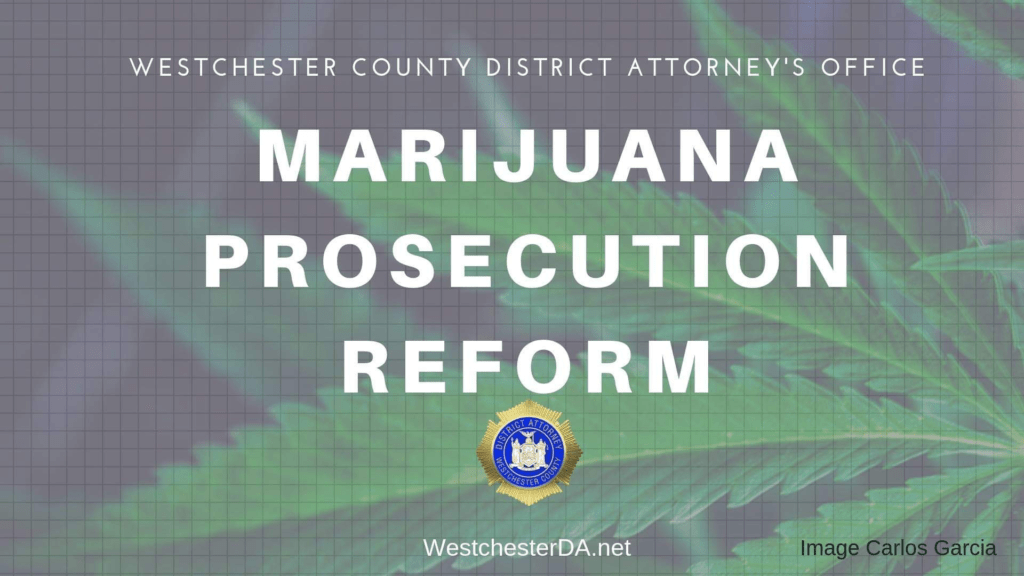Decriminalization vs. Legislation

By Dan Murphy
Effective immediately, Westchester District Attorney Anthony Scarpino Jr.’s office is implementing change in the handling of low-level marijuana offenses in Westchester County. Under this new policy, the possession of small amounts (2 ounces or less) of marijuana will no longer result in a criminal conviction, negating the collateral damage such a conviction might impose.
Specifically, the D.A.’s Office will no longer prosecute the violation offense in Penal Law §221.05, unlawful possession of marijuana; and the B misdemeanor offense in Penal Law §221.10, fifth-degree criminal possession of marijuana, based on the possession of an aggregate weight of more than 25 grams, provided the person is only charged with those offenses.
Regarding the second charge, the DA’s Office will prosecute the B misdemeanor offense in Penal Law §221.10 only as a violation (under Penal Law §221.05 for unlawful possession of marijuana) when a person possesses, in a public place, burning or publicly viewable marijuana, provided the person is only charged with this offense. This will avoid the stigma of a criminal record for many young people with long-lasting negative consequences disproportionate to the minor nature of the offense, said the district attorney.
His review of the prosecution of lower-level marijuana offenses is ongoing and further changes will be announced as they are adopted.
“After a careful review of marijuana cases in Westchester, as well as discussions with police, community leaders and advocates, we have made the decision to change how we prosecute such offenses,” said Scarpino. “This decision not to prosecute specific cases will allow many people to move forward with their lives without the stigma attached to criminal records of any kind – records that cause discrimination in housing, job and school applications. Much of this has burdened our minority communities and we believe it is time to rectify that.”
Beyond this decision, Scarpino is urging Gov. Andrew Cuomo and state legislators to create a uniform approach to prosecuting marijuana offenses and end the disparity currently in place from county to county. Cuomo announced in his recent State of the State address a proposal to legalize recreational marijuana.
Scarpino made sure to be clear that his recent efforts are aimed at decriminalizing marijuana, not legalizing it. “This is not legalization, this is decriminalizing it, because of the ramifications that occur and collateral damage,” he said. “This change in how low-level marijuana cases are handled is also aimed at a better use of public resources. What has been spent on arrests and prosecutions can now be used to focus on more serious crimes.”
This progressive action by the DA’s Office follows bail reform, which was announced last year at this time. The DA’s Office no longer requests bail for defendants whose cases would not end in a sentence of incarceration, eliminating cash bail for most misdemeanors.
Scarpino said: “These reforms in the bail process and marijuana prosecution are illustrations of our commitment to a fairer system of justice that works for every member of our community, no matter where they live, the color of their skin or the amount in their wallets.”
A report by the Westchester Coalition for Police Reform found that African-Americans and Latinos make up less than 40 percent of the population, but represent about 84 percent of the people arrested for low-level possession.
Several Westchester Democrats, including County Legislator Christopher Johnson, have called for decriminalization of marijuana and have asked Scarpino to take the action he just made.
Not all members of law enforcement agree with decriminalization of pot. George Winsman, a former Westchester County police officer, recently asked the Yorktown Town Board to oppose Cuomo’s initiative to legalize marijuana.
“We teach you in DARE not to smoke marijuana,” he said. “We tell you all along not to smoke marijuana, and then, well, since we can get a tax on it, it’s OK to smoke it. It’s ridiculous. Police officers, truck drivers, train people – all have to be tested for marijuana, and all drugs, if they have an accident.”
Members of the Yorktown Town Board then debated the merits, and the legality, of zoning out any marijuana stores within the town. Councilman Ed Lachterman called marijuana “a gateway drug,” claiming that smoking pot leads to the use of other drugs.





